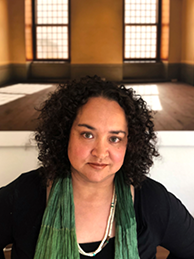Bio | Research
Carine Zaayman is an artist, curator and scholar committed to critical engagement with colonial archives and collections, specifically those holding strands of Khoekhoe pasts. Bringing intangible and neglected histories into view is a key motivation for her work. Her research aims to contribute to a radical reconsideration of colonial archives and museum collections, especially by assisting in finding ways to release their hold over our imaginations when we narrate the past, as well as how we might shape futures from it. She obtained a PhD in Fine Art from the University of Cape Town in 2019 where she also taught in the Michaelis School of Fine Art and the Centre for Curating the Archive). At present, Zaayman is a Researcher and Research Coordinator at the RCMC (https://www.materialculture.nl/en) at the National Museum of World Cultures in the Netherlands. She collaborates on curatorial projects in South Africa, including A !Nau For Now: Crossing Oceans Inside (https://arts.uj.ac.za/the-pandemic-project-fana-tshabalala/) and the ongoing Under Cover of Darkness (https://undercoverofdarkness.co.za/). Her most recent publications include Anarchival Practices at ICI Berlin (https://press.ici-berlin.org/catalogue/doi/10.37050/wpc-ca-01), and a contribution to the forthcoming publication We Contain Multitudes: Expanding Spaces and Forms of Mentorship Within Art Education Practices from ARTez written in collaboration with Nuraini Juliastuti.
Below is how she conceives of her work along less formal lines.
Informal bio
As an artist, curator and scholar,
Carine Zaayman is always attending to absence.
Particularly of Khoekhoe histories,
in colonial archives and museum collections.
She works to find ways to escape the limits of these places,
and to help realize potential pasts.
Carine employs a triangle of methodologies, one that moves between artistic practice, curatorship, and scholarship. This multi–valent approach keeps re-arranging its ratios, but she thinks of all of the processes within it as creative ways of making, of slowly building an understanding of a world that is haunted by the past. She is working to accord due worth that which we cannot put into words, to acknowledge the full tangibility and intangibility of experience that connects us to the people from the past as well as each other. Her way of working and thinking is borne from living in South Africa and her rootedness in Cape Town, a place where the legacies of colonialism, slavery, and apartheid continue to shape the material as well as emotional landscapes of all its inhabitants.
Contact: carine.zaayman@wereldculturen.nl
